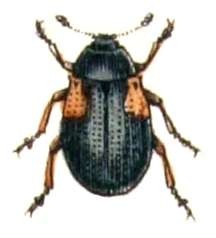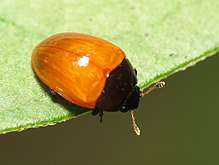Tritoma
Tritoma is a genus of beetles in the family Erotylidae, the pleasing fungus beetles. It is distributed worldwide, mainly in the Old World.[2] There are over 100 species.[2]
| Tritoma | |
|---|---|
 | |
| Tritoma bipustulata | |
| Scientific classification | |
| Kingdom: | Animalia |
| Phylum: | Arthropoda |
| Class: | Insecta |
| Order: | Coleoptera |
| Family: | Erotylidae |
| Tribe: | Tritomini |
| Genus: | Tritoma authority = Fabricius, 1775[1] |

Some species consume euagaric mushrooms, staying concealed amidst the gills as they feed.[3] Some feed on mushrooms growing from dead trees, as well as mycorrhizae on living roots.[4] One of the most common pleasing fungus beetles in Europe, T. bipustulata, is a black beetle with red spots which engages in autohaemorrhaging as a defensive behavior.[5]
Molecular analysis suggests that Tritoma is paraphyletic, and might be best treated as two separate genera.[3]
Species
These 23 species belong to the genus Tritoma:
- Tritoma angulata Say, 1826 i c g b
- Tritoma atriventris LeConte, 1847 i c g b
- Tritoma aulica (Horn, 1871) i c g
- Tritoma biguttata (Say, 1825) i c g b
- Tritoma bipustulata Fabricius, 1775 g
- Tritoma erythrocephala Lacordaire, 1842 i c g b
- Tritoma fasciata Chujo, 1941 g
- Tritoma gressitti (Chujo, 1968) g
- Tritoma humeralis Fabricius, 1801 i c g b
- Tritoma kanekoi Araki, 1943 g
- Tritoma metasobrina Chujo, 1941 g
- Tritoma mimetica (Crotch, 1873) i c g b
- Tritoma pulchra Say, 1826 i c g b (handsome tritoma)
- Tritoma sanguinipennis (Say, 1825) i c g b (red-winged tritoma)
- Tritoma shirakii Chujo, 1936 g
- Tritoma subbasalis (Reitter, 1896) g
- Tritoma sungkangensis Nakane, 1966 g
- Tritoma taiwana Chujo, 1936 g
- Tritoma takasagona Chujo, 1941 g
- Tritoma tenebrosa Fall, 1912 i c g b (darkling tritoma)
- Tritoma unicolor Say, 1826 i c g b
- Tritoma yamazii Chujo, 1941 g
- Tritoma yiei Nakane, 1966 g
Data sources: i = ITIS,[6] c = Catalogue of Life,[7] g = GBIF,[8] b = Bugguide.net[9]
References
- International Commission On Zoological Nomenclature (1994). "Opinion 1754. Histoire abrégée des insectes qui se trouvent aux environs de Paris (Geoffroy, 1762): some generic names conserved (Crustacea, Insecta)". Bulletin of Zoological Nomenclature. 51 (1): 58–70.
- Goodrich, M. A. and C. A. Springer. (1999). The pleasing fungus beetles (Coleoptera: Erotylidae) of Nebraska. Transactions of the Nebraska Academy of Sciences 25 53-71.
- Robertson, J. A., et al. (2004). A molecular phylogenetic analysis of the pleasing fungus beetles (Coleoptera: Erotylidae): evolution of colour patterns, gregariousness and mycophagy. Systematic Entomology 29(2) 173–87.
- Skelly, P. E. Pleasing Fungus Beetles, Pseudischyrus, Tritoma, Megalodacne, Ischyrus spp. (Insecta: Coleoptera: Erotylidae). EENY-091. Entomology and Nematology. Florida Cooperative Extension Service. University of Florida IFAS. 1999.
- Drilling, K. and K. Dettner. (2010). First insights into the chemical defensive system of the erotylid beetle, Tritoma bipustulata. Chemoecology 20(4), 243-53.
- "Tritoma Report". Integrated Taxonomic Information System. Retrieved 2018-04-25.
- "Browse Tritoma". Catalogue of Life. Retrieved 2018-04-25.
- "Tritoma". GBIF. Retrieved 2018-04-25.
- "Tritoma Genus Information". BugGuide.net. Retrieved 2018-04-25.